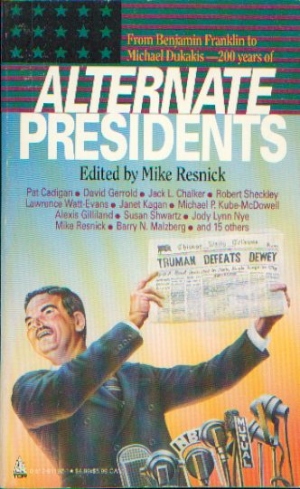Birthday Reviews: Jack L. Chalker’s “Now Falls the Cold, Cold Night”

Jack L. Chalker was born on December 17, 1944 and died on February 11, 2005.
Although Chalker may be best known for his Well of Souls series of novels, his only Hugo Award nominations were for his amateur magazine, Mirage, in 1963 and his non-fiction book The Science Fantasy Publishers: A Critical and Bibliographic History: Third Edition, co-written with Mark Owings. The book also won the Readercon Award in 1992. Chalker was a two-time nominee for the John W. Campbell Award for Best New Writer. In 1980 he received the Skylark Award from NESFA, and in 2005 he posthumously received the Phoenix Award from DeepSouthCon.
Chalker wrote “Now Falls the Cold, Cold Night” for Mike Resnick’s 1992 anthology Alternate Presidents. The story has never been reprinted. It was his last published piece of short fiction, although Chalker continued to publish novels and non-fiction.
Set in a rooming house in Albany, New York, “Now Falls the Cold, Cold Night” takes place in a world in which following James Buchanan’s death during the election of 1856, Millard Fillmore is able to capture a second term on the Know-Nothing ticket. Fully embracing his anti-immigration stance, Fillmore is in thrall to the Southerners who helped elect him and promotes pro-slavery policies, including the enforcement of the Fugitive Slave Act passed during his first term in 1850. His policies have caused unrest in New England, resulting in a second Boston Massacre when troops opened fire on citizens trying to stop a runaway slave from being taken back to the South.
The rooming house is a collection of men who have business with the New York state legislature, although one of them, Mr. Green, keeps to himself, leading another, Mr. Morgan, to question his purpose. The two play a cat and mouse game revealing that they actually have been aware of each other for quite some time. While both claim, like all the men in the rooming house, to oppose Fillmore’s agenda, they have very different methods of fighting for what they believe is right.
Chalker builds up his resistance and sounds a cautionary tale about how easy it is for the United States to espouse poorly thought out or exclusionary policies. Chalker’s troops under Fillmore force the recurrence of the Boston Massacre in an almost Bundestag fire manner. Even as it takes place in a world where Southern secession is feared and drives policy, Chalker hearkens back to the threat of New England secession during the War of 1812.
Reviewed in its only appearance in the anthology Alternate Presidents, edited by Mike Resnick, Tor Book, 1992.
 Steven H Silver is a sixteen-time Hugo Award nominee and was the publisher of the Hugo-nominated fanzine Argentus as well as the editor and publisher of ISFiC Press for 8 years. He has also edited books for DAW and NESFA Press. He began publishing short fiction in 2008 and his most recently published story is “Webinar: Web Sites” in The Tangled Web. Steven has chaired the first Midwest Construction, Windycon three times, and the SFWA Nebula Conference 6 times, as well as serving as the Event Coordinator for SFWA. He was programming chair for Chicon 2000 and Vice Chair of Chicon 7.
Steven H Silver is a sixteen-time Hugo Award nominee and was the publisher of the Hugo-nominated fanzine Argentus as well as the editor and publisher of ISFiC Press for 8 years. He has also edited books for DAW and NESFA Press. He began publishing short fiction in 2008 and his most recently published story is “Webinar: Web Sites” in The Tangled Web. Steven has chaired the first Midwest Construction, Windycon three times, and the SFWA Nebula Conference 6 times, as well as serving as the Event Coordinator for SFWA. He was programming chair for Chicon 2000 and Vice Chair of Chicon 7.
You really don’t get a lot of stories featuring Millard Fillmore as any kind of pivot point. Too bad.